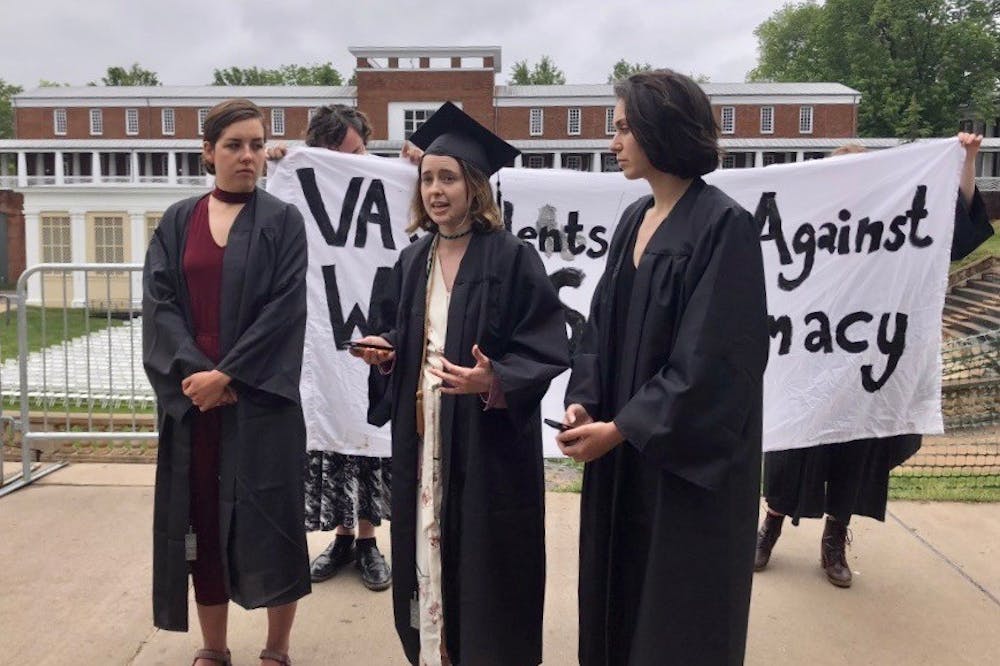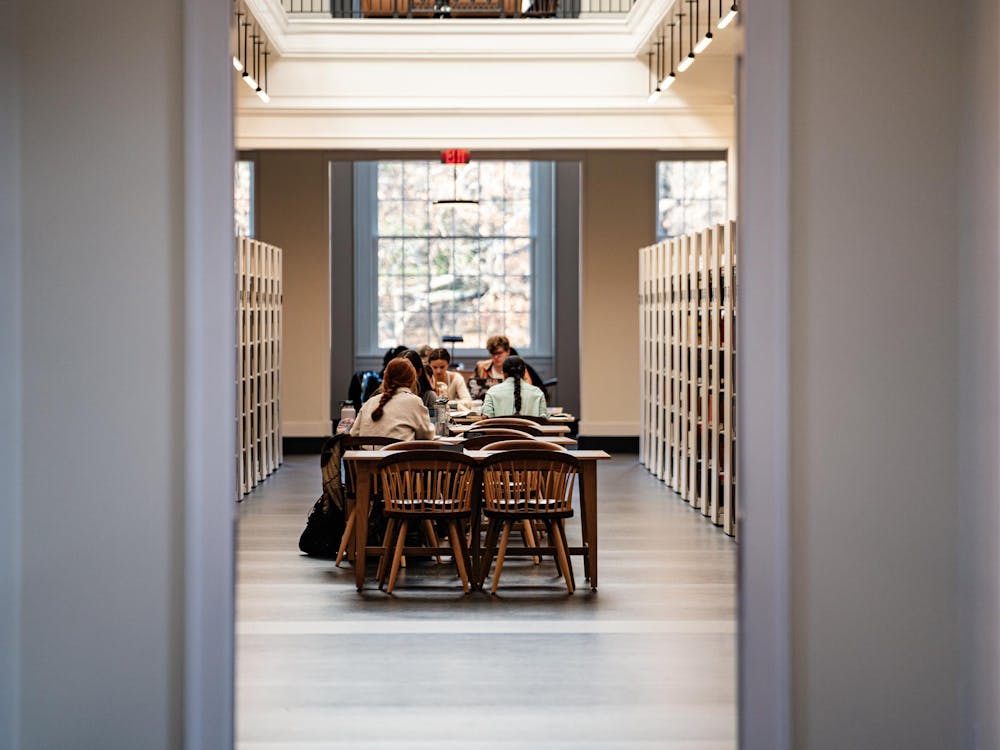As a parade of students marched down the Lawn during Final Exercises Saturday — many holding balloons, some shedding tears — the last few undergraduates in the processional were holding something noticeably different.
A white banner, reading “VA Students Act Against White Supremacy,” marched down the Lawn with the rest of the processional. This is the same banner several students — three of whom spoke at a U.Va. Students United press conference — held as they stood surrounding the statue of Thomas Jefferson near the Rotunda during the torchlit white nationalist march on Grounds last August.
Fourth-year College student Clara Carlson held this banner both on Aug. 11 and today as she walked the lawn. During the press conference, Carlson and fellow activists spoke about their reaction to the administration and law enforcement’s responses to various events over the past year.
“Throughout the year, we’ve met with U.Va.’s highest administrators, we’ve met with the dean of students, the president, the provost, the dean of the Law School, the rector of the Board of Visitors and the vice rector of the Board of Visitors,” said Caroline Bray, a fourth-year College student. “...Yet we’ve been met mostly with deaf ears. And while we have finished our time here at U.Va., we will never stop fighting against white supremacy.”
Bray, Carlson and fellow speaker and fourth-year Architecture student Sophie Schectman listed three major demands for the University at Saturday’s press conference.
First, that the University publicly acknowledge the violence caused by white supremacists on Grounds and issue a public condemnation of white supremacy. Next, that any identified white supremacists from the Aug. 11 march be banned from University property, beyond the trespass warning recently issued to Jason Kessler, a white nationalist and organizer of the “Unite the Right” rally. Third, the students demanded the University pay any of the remaining medical bills for those injured in the fatal car attack of Aug. 12.
Schectman was one of the protesters injured in the car attack and suffered two broken legs, multiple contusions and a concussion. As a result, she has had to undergo extensive medical treatment to recover.
“U.Va. has refused to address this even though their hospital treated many of the survivors,” Schectman said. “Survivors are still struggling to make ends meet even though U.Va. has the resources to help.”
The University did not immediately respond for comment Saturday evening.
In September, University President Teresa Sullivan announced that the University would allocate $12,500 from private sources toward the Charlottesville Patient Support Fund, which supports people who were injured during the white supremacist rallies of Aug. 11 and 12.
During Saturday’s graduation ceremony, University President Teresa Sullivan delivered the commencement address, speaking of the benefits students could reap from being resilient and flexible in their future endeavors. This talk of resilience frustrated Bray, who felt Sullivan’s email condemning her and others for shrouding the statue of Thomas Jefferson with black fabric in September did not send this type of message.
“I find it ironic that she acknowledged resilience at all,” Bray said. “When I asked the days following August 11 where she was that night, she snapped at me. She had no compassion and asked me why I didn’t tell her that the Nazis were coming.”
In addition to their three main demands, Carlson spoke of Students United’s support for Eric Martin, a community member arrested in April for sitting in the same room as Kessler at the University Law Library.
“Yet again, we saw police protect a known white supremacist while they arrested Eric Martin for trespassing, and he now faces jail time,” Carlson said. “He showed up for us and our community, which means we have the opportunity to show up for him at his court date.”
The University ultimately issued a no-trespass warning to Kessler in late April which prohibits him from entering University property.
Schectman expressed discontent with the University’s new ‘unaffiliated persons’ policy, which prevents those not currently students or employees of the University — including alumni — from gathering on Grounds without at least seven days advance registration with the University. The policy limits each speaker or group to a two-hour block, once per week in one of a list of designated locations on Grounds. The policy was first proposed by the Deans Working Group which Sullivan created to review the University’s response to Aug. 11. Students United has met with the group and expressed their disapproval of the new policy.
“We don’t believe that [the policy] is going to bring the necessary change to this institution,” Schectman said. “It will most likely fall more harshly on student protesters, especially these policies that we’ve seen in the last year. Student protesters have been arrested whereas only one no trespass order has been issued to a Nazi — Jason Kessler.”
While the policy should not limit student protesters from saying what they want on Grounds, there is ambiguity regarding how it will be enforced when the group protesting contains both students and non-affiliated persons.
In addition, Carlson emphasized her disappointment in the University’s past emails discouraging students from participating in protests and her hope that the one year anniversary of the on-Grounds and Downtown Mall demonstrations would not be met with similar warnings.
“We’ve learned a lot in the past nine months and have grown together. We know how to protect each other and keep each other safe and will continue demanding more from this institution,” Carlson said.“... Something we’ve articulated to the University over and over again is students have a right to stand up against white supremacy.”





